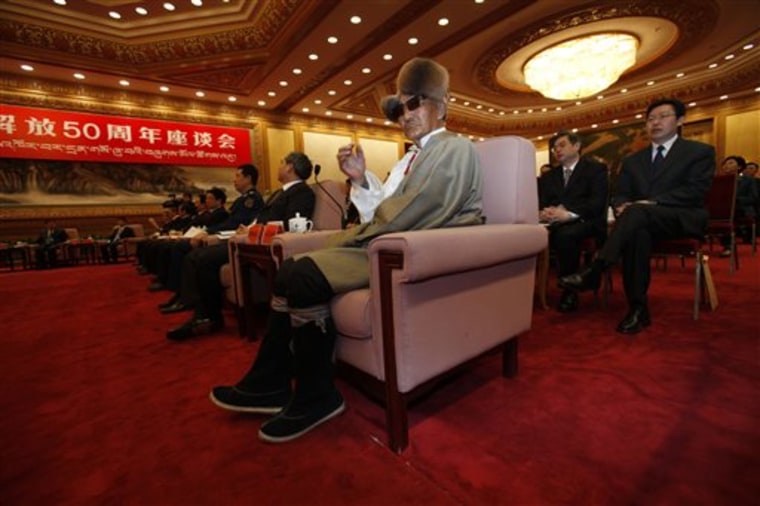China celebrated 50 years of direct control over Tibet with a lavish international Buddhist conference Saturday featuring a rare appearance by Beijing's hand-picked Buddhist leader — underscoring efforts to promote its image as a protector of the faith.
March 28 marks the date when China ended the 1959 Tibetan uprising, sending Tibetan spiritual leader the Dalai Lama over the Himalayas into exile in India and placing Tibet under its direct rule for the first time.
In China's official version of events, Tibet in mid-century was a remote medieval backwater where most people lived in servitude to the Buddhist theocracy and nobility until the Communist government stepped in. To support that contention, China commemorated a new political holiday Saturday — "Serfs Liberation Day."
"Just as Europe can't return to the medieval era and the United States can't go back to the times before the Civil War, Tibet can never restore the old serf society era," Zhang Qingli, the Communist Party boss of the region, told a crowd of more than 13,000 in Lhasa, the Tibetan regional capital where the government held a separate ceremony for the holiday.
'Offensive and provocative'
The Tibetan government-in-exile said on its Web site that the new holiday is aggravating problems in the region and would be a day of mourning for Tibetans around the world.
"Tibetans consider this observance offensive and provocative," it said.
Hundreds of Tibetans in the northern Indian city of Dharmsala — the headquarters of Dalai Lama's government-in-exile — and in the Nepalese capital of Katmandu held street protests against Beijing's rule.
China has stepped up its attacks on the Dalai Lama after the exiled Tibetan spiritual leader compared life under Chinese rule to "hell on earth" earlier this month.
The World Buddhist Forum in the eastern lakeside city of Wuxi featured an appearance by the Panchen Lama, the second-highest figure in Tibetan Buddhism, whose status is rejected by followers of the Dalai Lama.
The Panchen Lama's rare appearance at the forum was a strong indication of Beijing's determination to boost his profile as a credible religious figure, placing him alongside other Asian Buddhist leaders, action film star Jet Li, and hundreds of other international participants.
"This event fully demonstrates that today's China enjoys social harmony, stability, and religious freedom, and also shows that China is a nation that safeguards and promotes world peace," the Panchen Lama said, in an address delivered in English to the opening ceremony that featured a Buddhist choir dressed in orange and vermillion robes and dancers arrayed in costumes evoking ancient China.
Under Chinese rule
Despite Beijing's backing, Gyaltsen Norbu is not widely accepted by Tibetans as the Panchen Lama. Another boy, Gendun Choekyi Nyima, was named as the reincarnation of the Panchen Lama by the Dalai Lama in 1995. The boy and his family disappeared soon after and have not been heard from since.
Buddhism arrived in China 2,000 years ago and has endured alternating periods of flowering and government-sponsored purges. Following the founding of the communist state in 1949, monks and nuns were forced from their monasteries, temples were converted to factories, and the religion mocked as a backward vestige of feudal China.
Tibetan Buddhism and different types of Chinese Buddhism are practiced differently, though there are close ties historically.
A host of articles in the state-run media and shows on TV have extolled Communist reforms and economic development, likening the end of the Dalai Lama's rule as akin to late U.S. President Abraham Lincoln's emancipation of slaves.
While Chinese rule has brought economic development, higher living standards and infrastructure to the remote Himalayan plateau where people traditionally eked out a living by farming and herding, Tibetans say they have lost religious and cultural freedoms and become marginalized in their homeland.
A year ago Tibetan communities across China erupted in violent protests against Chinese rule, drawing a swift clampdown by paramilitary forces that remain in place.
